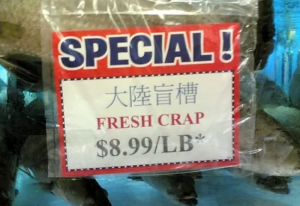Here’s an amusing – but entirely relevant – article from Real Business, on lessons to learn when translating English words into a foreign language.
We all make fun of menus, adverts and other forms of branding produced by naïve non-English speakers which contain unintentional double entendres, absurd grammatical mistakes and more. But what about the English words which do not work in other languages?
However, this cuts both ways, and the international nature of ecommerce means that English-speaking e-tailers should not be complacent and assume that their brand names or product wording will automatically work in non-English speaking territories.
Ecommerce platform Tictail, which looks after 60,000 international stores, worked with translation firm Kwintessential to compile a list of the English words and phrases that simply don’t work or should be avoided in other languages.
“While most e-tailers, whether home-grown entrepreneurs or existing small businesses selling online for the first time, need not worry about how their brand or product names and descriptions will be received abroad, others may need to tweak their wording and change their phrasing, to ensure that they sell rather than amuse,” explains Carl Waldekranz, the founder of Tictail.
English words that don’t work well in Japanese
English word: Jerry
Japanese interpretation: The name Jerry might be perfectly inoffensive on a western brand, but could be inadvertently off-putting in Japan where the word ‘geri’ (u4e0bu75e2) means diarrhoea. Presumably, this isn’t quite the association Ben and Jerry’s had in mind.
Are you making the most of your marketing?
Find out – book your free marketing audit here.
English words that don’t work well in German
English word: Mist
German interpretation: Mist is among the most evocative of English words, it suggests purity, delicacy and the veiled promise of beauty, and numerous Anglophone brands have used it to nurture desirable associations. It has quite the opposite effect in German however, where it simply means sh*t.
English word: Gift
German interpretation: The English word gift has a myriad of pleasant associations. Where then could an online business describing itself as a ‘gift shop’ possibly repel consumers? Well, in Germany, most definitely, where the word ‘gift’ means poison.
English word: Latte
German interpretation: To the average English speaker the word Latte might simply be a chic Italian term for a milky coffee. Not so in German, where the literal meaning of latte is ‘pole’, which is a German slang term for an erect penis.
English words that don’t work well in French
English word: Bite
French interpretation: If your brand message encourages customers to ‘grab a bite,’ be careful to make some adjustments when entering the French market. In France the word bite translates to ‘dick,’ a slang term for penis.
English word: Drugs
French interpretation: Don’t start a Pharmacy in France using the term drugstore, or use the term ‘drugs’ in your brand messaging, as the French don’t interpret the word as referring to pharmaceutical medicine, but rather to heavy-duty illegal recreational intoxicants.
English words that don’t work well in Portuguese
English word: Enjoy
Portuguese interpretation: The English word ‘enjoy’ sounds very similar to the Portuguese
word ‘enjoar,’ which means to nauseate or sicken. It goes without saying that marketing your business in Portugal while using the term enjoy in your branding messaging might be ill-advised.
English word: Exquisite
Portuguese interpretation: In Portuguese the word ‘esquisito’ means ‘weird’. Therefore, an online gift shop marketing ‘exquisite presents’ would be interpreted in Portugal and Brazil as trading in weird, odd, or freaky goods.
English words that don’t work well in Spanish
English word: Cool
Spanish interpretation: If you’re intending to trade in Spanish speaking territories, then don’t include the Anglophone word ‘cool’ in your branding. And certainly don’t name the business ‘coolio’ or ‘coolo,’ as the Spanish speaking world will associate it with the slang term ‘culo,’ which is a vulgar way of describing someone’s behind in Spanish.
English word: Tuna
Spanish interpretation: The offer of fresh tuna may get slightly lost in translation where Spanish customers are concerned. In Spain the word ‘tuna’ is associated with the tradition of fundraising student singing groups. Worse still, the word is interpreted to mean drunkenness in some Central American countries.
Are you making the most of your marketing?
Find out – book your free marketing audit here.
English words that don’t work well in Russian
English phrase: Blue water
Russian interpretation: The English language phrase ‘blue water’ translates to ‘u0431u043bu044eu0432u043eu0442u0430’ in Russian – a vulgar term for vomit.
English words that don’t work well in Dutch
English word: Bill
Dutch interpretation: The man’s name Bill sounds like the Dutch word ‘bil,’ which means bum or buttocks. Therefore, if your name is Bill, and you use it in your branding, it might inadvertently raise a few sniggers amongst Dutch customers.
English word: Cut
Dutch interpretation: Whatever you do, don’t set-up a business and use the word ‘cuts’ in the name and take it over to the Netherlands: in Dutch it sounds like the slang term c*nt. Cut is similar to ‘kut,’ which is the ‘c’ word in the Netherlands.
English word: Lager
Dutch translation: The word ‘lager’ will cause most English speakers think of beer; however, in Dutch the word lager translates to ‘lower’ or ‘storage’. Marketing lager to the Dutch might be problematic if they think you’re selling storage.
English words that don’t work well in Italian
English word: Tremendous
Italian interpretation: Be careful when translating your brand message about ‘tremendous savings’ into Italian or Spanish – it could be interpreted as horrific or awfully poor savings. In Italian the word ‘tremendo’ means terrible. And, at all costs, avoid ill-considered alliterations when using your own name. For example, ‘Tom’s Tremendous Tupperware’ will call-to-mind amongst Italians or Spaniards ‘Atrocious Tupperware by Tom.’
General European language blunders with English words
English word: Preservative
Interpretation: Be careful when using the term preservative, as in jam, when marketing to Continental Europeans. Your brand promise of ‘homemade preservatives’ might be interpreted to mean that you’re peddling ‘homemade condoms’ in Spain, Italy, France, Germany, and many other European Countries.
English words that don’t work well in Norwegian
English word: Fitter
Interpretation: ‘Fitte’ is a vulgar Norwegian word to describe a woman’s intimate parts. So a business promising to help you ‘get fit’ might well raise eyebrows in Norway.


















Leave a Reply
Your email is safe with us.